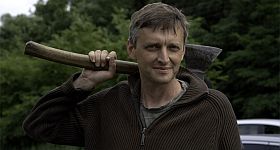


Sergei Loznitsa – from Mathematics to Filmmaking

Ukranian filmmaker Sergei Loznitsa is being honoured with a big retrospective of his work (11 documentaries) at Doc Fest in Thessaloniki, that runs until March 20. The festival has a fine newsletter (free subscription) from where this press text – in an edited form – has been taken:
Loznitsa talked about his sources of inspiration, the differences between fiction and documentary films and his relationship with audiences during a press conference he gave on Tuesday, March 15, 2011 in the framework of the 13th Thessaloniki Documentary Festival.
His career in the documentary genre began during a very fruitful time of his life, even though he was not as yet devoted to art, but to science. He was born in 1964 in Belarus. Shortly after, his family moved to the Ukraine, were he studied applied mathematics and control systems at Kiev’s Polytechnic. The director said that he decided to change profession because of the low-quality training he received in Kiev, but he added that mathematics helped him in his transition to filmmaking. “A film is, in a way, a means to control things, and also a language used by people to communicate. Control systems are not all that different from films. In my view, anyone who wants to work in
film should start from something more abstract, like mathematics or music. From there, you can move to whatever you want and become, say, a politician or manager.
Loznitsa records simple, everyday aspects of life in the form of a historical testimony. He starts from things immediately apparent and then moves on to shed light on sensitive, hidden aspects, leaving nothing to chance. Aesthetics, form, style work latently, without making any noise. Referring to his method of work, he noted: “It is personal and I might say similar to hunting. I look for ideas all around me, like a hunter seeking out his pray. In this process, you have to let go of your mind and operate on feelings alone. Usually, when we are about to start work on a film, two or three of us gather together with a camera, sound equipment and a car. We spend two weeks traveling before shooting, with no specific idea in our minds, just looking around for something that will catch our eye“.
The “secret” of success in this process, according to the director, is this: “you have to cleanse yourself from all signs of life around you; you need to lose contact with the things that hold you back and see things more clearly. It is a mystical process“. The major goal of his films is to keep the viewer alert. This purpose is served by the lack of narration – the trademark of his films. “The most important thing is to allow the viewer to understand who he is. To allow him to get something from the film, to be influenced by it and be able to build on that influence”, he noted.
The director had once said that “cinema takes us back to time lost”. What is his relationship with time when making a film? “Sometimes I do realize I have to put an end to it. It is easier when we are using film, because it is bound to run out eventually”, he said jokingly, adding: “Any kind of pressure is welcome. Besides, this is the second law of Thermodynamics”. Illustrating his point, the director told a story from the time he was shooting Northern Light. The crew had to travel thousands of kilometers from Saint Petersburg to reach a remote village. “We had been shooting there for two weeks, when the local KGB came and took us in for a day and a half, in order to ascertain we weren’t spies. I took this as a sign that we should probably wrap it up”. Commenting on the differences between feature films and documentaries, he said they only exist “in our mind”. “If I showed you a shot of a suicide scene, it might impress you enough to ask me who this amazing actor is. But if I told you this was a documentary and that the person did actually take his life, you would be shocked. Nothing would have changed in the material per se – the difference is in our minds and reflects our ethics and norms”.